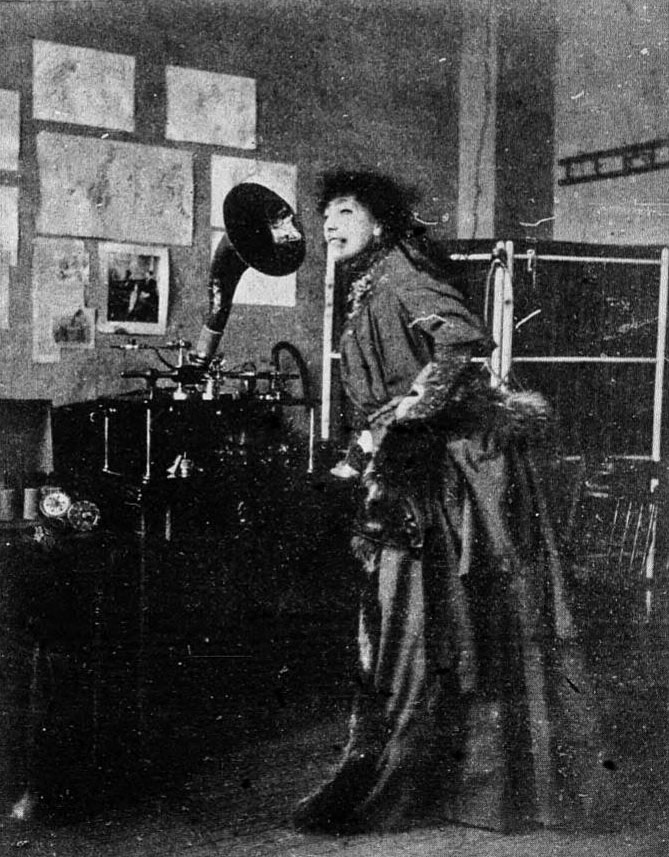By Doug Boilesen, 2020
Mary Garden was the prototype
for Eden Bower in Coming, Aphrodite! and was one of the
prototypes for Kitty Ayrshire in the two stories in Youth and
the Bright Medusa which feature Ayrshire -- Scandal
and A Gold Slipper.
Besides starring on the opera stage
Garden made phonograph records and was featured in advertisements
which added her celebrity status, artistic reputation, and the prestige
of opera to the promotion of the early phonograph and its records.
Like the other Cather opera singing
prototypes for Youth and the Bright Medusa stories, Garden's
connections with the phonograph and opera records and her role as
an influencer in popular culture give Coming Aphrodite! a
place on the PhonoLiterature bookshelf even though no phonograph
was actually in the book.
For examples of Mary Garden as a phonograph
recording artist and her popular culture role as seen in phonograph
advertisements and other ephemera see Mary
Garden - Recording Artist and Willa Cather Prototype.
Other Six-Degrees of Separation
Phonograph Connections
The song "Blue Bell" is
played at Coney Island "when Molly Welch and then Eden Bower
return to the ground after each performs on a trapeze suspended
from a hot-air balloon." (1)
"Blue Bell" was recorded
by many record companies (Victor, Zonophone, Busy Bee, Columbia)
and a 1904 Edison 2-minute cylinder recording can be heard below.
"Blue Bell" by Madden and
Morse. Published by F.B. Haviland, New York, 1904 (Giovannoni-Sheram
Collection).

"Blue Bell" by Albert Benzler
and James Hager (bells & xylophone) (w/ Orch), Edison 2-minute
Gold Moulded Record
No. 8829, Released Nov/Dec 1904 (Courtesy
i78s.org).


The Edison Phonograph
Monthly, October 1904
The hot air balloon trapeze event
at Coney Island also has a multi-degree phonograph connection
between Eden Bower and Sarah Bernhardt, the renowned French actress
who was one of the early celebrities who spoke into the phonograph.
The following text from Coming,
Aphrodite! describes Eden Bower's balloon ride at Coney Island
which has been argued by Cather scholar Eveyln Funda as possibly
"modeled after a simliiar stunt by actress Sarah Bernhardt,
whom Cather revered, during the 1878 Paris Exhibition." (2)
When the band began to play a
two-step, all the bathers ran up out of the surf to watch the
ascent. The second balloon bumped and rose, and the crowd began
shouting to the girl in a black evening dress who stood leaning
against the ropes and smiling. "It's a new girl," they called.
"It ain't the Countess this time. You're a peach, girlie!"
The balloonist acknowledged these
compliments, bowing and looking down over the sea of upturned
faces,but Hedger was determined she should not see him, and he
darted behind the tent-fly. He was suddenly dripping with cold
sweat, his mouth was full of the bitter taste of anger and his
tongue felt stiff behind his teeth. Molly Welch, in a shirt-waist
and a white tam-o'-shanter cap, slipped out from the tent under
his arm and laughed up in his face. "She's a crazy one you brought
along. She'll get what she wants!"
"Oh, I'll settle with you, all
right!" Hedger brought out with difficulty.
"It's not my fault, Donnie. I
couldn't do anything with her. She bought me off. What's the matter
with you? Are you soft on her? She's safe enough. It's as easy
as rolling off a log, if you keep cool." Molly Welch was rather
excited herself, and she was chewing gum at a high speed as she
stood beside him, looking up at the floating silver cone. "Now
watch," she exclaimed suddenly. "She's coming down on the bar.
I advised her to cut that out, but you see she does it first-rate.
And she got rid of the skirt, too. Those black tights show off
her legs very well. She keeps her feet together like I told her,
and makes a good line along the back. See the light on those silver
slippers, that was a good idea I had. Come along to meet her.
Don't be a grouch; she's done it fine!" pp. 44-45

The Phonogram,
Nov-Dec 1891
Sarah Bernhardt speaking
into the Phonograph in Gianni Bettini’s Phonograph Laboratory while
on a visit to New York in 1891.
Bettini in 1898 offered Bernhardt
records as part of his "Specialty Records" at $6.00 each.


"Bettini Micro-Phonograph
and Records," June 1898 Catalog, p. 20 (Courtesy Stanford Library)
Another multi-degree
separation connection between Garden and Bernhardt involves Cleopatra.
Bernhardt played Cleopatra in 1891 and in 1916 Mary Garden was advertised
as the reincarnation of Cleopatra in a Rigaud Perfume ad. Mary Garden
appeared as Cleopatra in Massenet's first New York performance of
the opera on January 23, 1919 and performed the Death Scene from
Cléopâtre in a fund raiser at the Metropolitan on April 13,
1919. (3)

"Mary Garden is
the reincarnation of CLEOPATRA, Queen of Egypt."
Rigaud Perfume ad,
Red Book magazine, December 1916 (courtesy Internet Archive).

Sara Bernhardt as Cleopatra,
1891 performing in Victorien Sardou's Drama (Photographs courtesy
New York Public Library) (4)

At the end of Coming, Aphrodite!
Eden Bower's success in Paris is noted in her return to New York
at the Lexington Opera House with Bower now a legend and one of
the elite opera stars on stage.
COMING, APHRODITE! This legend,
in electric lights over the Lexington Opera House, had long announced
the return of Eden Bower to New York after years of spectacular
success in Paris. She came at last, under the management of an
American Opera Company, but bringing her own chef d'orchestre.
p. 70